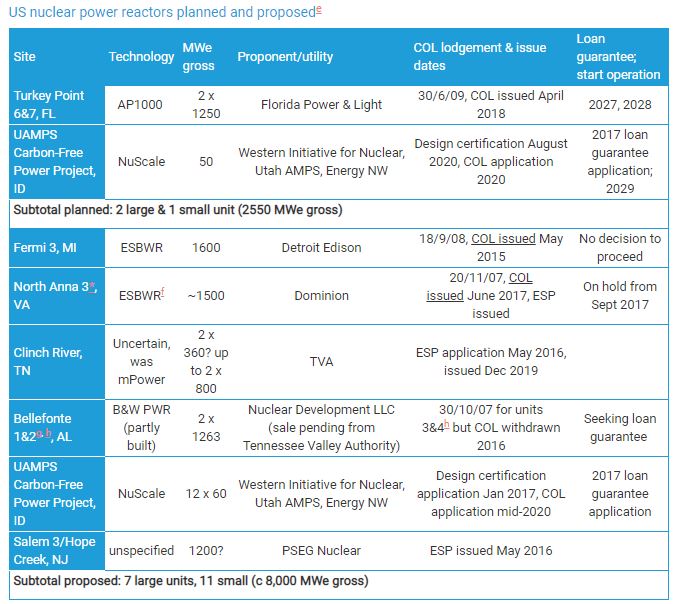INFRASTRUCTURE
WHAT INFRASTRUCTURE IS IN PLACE FOR NUCLEAR ENERGY?
ALL APPLICATIONS
DOE sources indicate that as of May 1, 2020, there were 53 commercially operating nuclear power plants with 95 nuclear power reactors in 29 U.S. states.[1] Of the currently operating nuclear power plants, 32 plants have two reactors and 3 plants have three reactors.[1] These nuclear power reactors are operated by 30 different power companies. Out of the 98 nuclear reactors in the U.S., 65 are pressurized water reactors and 33 are boiling water reactors. On average, the industry invests approximately $7.5 billion per year to support the maintenance and upgrades of these nuclear power plants.[2] While there are four nuclear power reactors under construction in the U.S., it is expected that only two units will come online by 2021.[2] In addition to those under construction, there are also three nuclear power reactors in the planning stages (two large units and one small unit) and 18 nuclear power reactors in the proposed stage (seven large units and 11 small units). The planned and proposed projects are all U.S.-based, as captured below.[2]

TRANSPORT AND THE HYDROGEN ECONOMY
Nuclear energy can be used to make hydrogen electrolytically and, in the future, high-temperature reactors may be used to produce it thermochemically. Burning hydrogen produces water vapor, which can be used in internal combustion engines, although its main use will be for fuel cells used in the automotive industry. Fuel cells are currently utilized in passenger cars, buses, trucks, and other vehicles such as forklifts. There are about 11,000 fuel cell vehicles on the road, worldwide, with about 8,741 fuel cell vehicles (cars) sold and leased in the U.S.[3] [4] As of November 2020, there are 34 active fuel cell busses and 30 fuel cell busses in development, in the U.S.[5]
The NREL maintains a spreadsheet of current and planned Fuel Cell projects in the U.S., updated as of November 2020. Additionally, the DOE maintains the Alternative Fuels Data Center, which offers a searchable database for alternative fuel vehicles (AFVs), engines, and hybrid/conversion systems.[6]

Updated by Theresa Pipher, November 2020

Comments are closed.